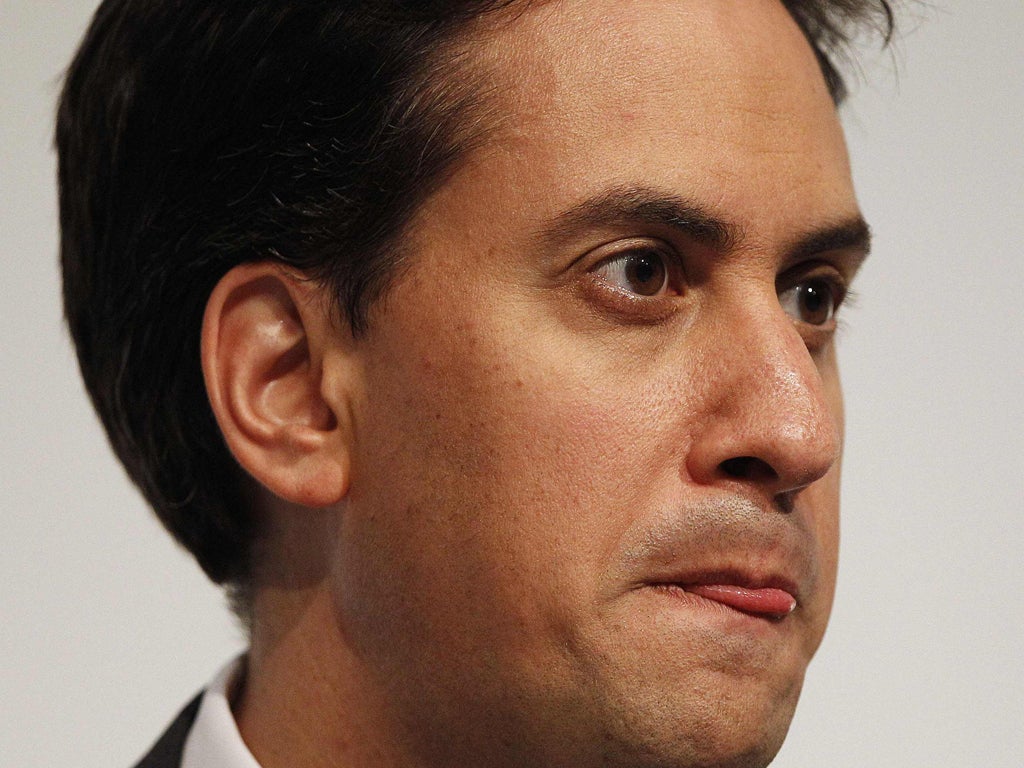More misery for Miliband as Cameron's EU veto gives Tories first lead in 14 months
Poll shows strong Conservative gain as Labour reflects on year of wasted opportunities

Your support helps us to tell the story
From reproductive rights to climate change to Big Tech, The Independent is on the ground when the story is developing. Whether it's investigating the financials of Elon Musk's pro-Trump PAC or producing our latest documentary, 'The A Word', which shines a light on the American women fighting for reproductive rights, we know how important it is to parse out the facts from the messaging.
At such a critical moment in US history, we need reporters on the ground. Your donation allows us to keep sending journalists to speak to both sides of the story.
The Independent is trusted by Americans across the entire political spectrum. And unlike many other quality news outlets, we choose not to lock Americans out of our reporting and analysis with paywalls. We believe quality journalism should be available to everyone, paid for by those who can afford it.
Your support makes all the difference.David Cameron ends 2011 on a political high as the Tories move ahead of Labour for the first time in 14 months in The Independent's latest poll of polls.
Click here to launch the graphic 'A year in politics: How party fortunes changed'
The figures will make disquieting reading for Ed Miliband, who has seen Labour's support edge down over the year despite attempts to seize the political initiative.
A weighted average of this month's polls put the Conservatives on 39 per cent (up four points), Labour on 38 per cent (down one point) and the Liberal Democrats on 12 per cent (unchanged). The one point Tory lead compares with a seven-point Labour advantage in January.
The strong Tory gain follows Mr Cameron's decision to use his veto at the European Union leaders' summit three weeks ago. His stance divided political opinion, but has proved popular among the public, with the Prime Minister's personal ratings improving since the Brussels confrontation.
John Curtice, professor of politics at Strathclyde University, who calculated the figures, said: "It looks as though some voters now see Mr Cameron in a new light, as a man who, for good or ill, does have convictions rather than as a mere pragmatist."
But he warned that the boost could be "something of a double-edged sword" for Mr Cameron if it was sustained into 2012. He said some Tory backbenchers would interpret it as proof that they can benefit politically from increased Euroscepticism, and press the Prime Minister to try to repatriate powers from Brussels. "Such pressure will not, of course, make the coalition with the Liberal Democrats any easier for Mr Cameron to maintain," he said.
If the figures were replicated in a general election, Labour would be the largest party in a hung Parliament, although its slender lead could be wiped out by planned changes to electoral boundaries. The weakening of Labour support over the past 12 months has fuelled muttering about Mr Miliband's leadership qualities, notably claims that he is failing win the political argument on the economy.
His allies point in his defence to five by-election victories, gains in this year's council elections, increased party membership and his tough stance on phone-hacking. They insist the party has made steady progress since suffering a heavy election defeat 18 months ago.
Mr Miliband is preparing a drive in the New Year focusing on living standards, a theme the party says will chime with families facing higher fuel and transport costs. His most testing time could come in May when elections are due for the London Mayor and in councils across England, Wales and Scotland.
Should Boris Johnson comfortably see off Ken Livingstone's challenge and Labour perform poorly in the town halls, then Mr Miliband will face trouble. One shadow minister said: "Ed could find himself under pressure in six months if things don't start to look up. There is a lot of goodwill towards him, but there is no denying that we're failing to make much progress."
The Tory chairman, Baroness Warsi, insisted she was unconcerned by the disclosure in The Independent yesterday that her party's backbenchers had rebelled in 31 per cent of Commons votes. She told BBC Radio 4's World at One: "It shows we're a healthy, vibrant, broad church of a party, it shows there are people within the party who have differences of opinion." She said the high numbers of recently elected MPs among the rebels showed the new intake included people who brought "robustness" and "passion for politics" to Westminster.
Join our commenting forum
Join thought-provoking conversations, follow other Independent readers and see their replies
Comments